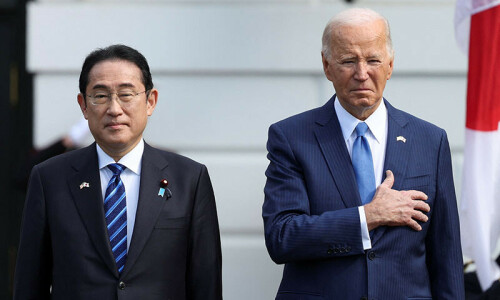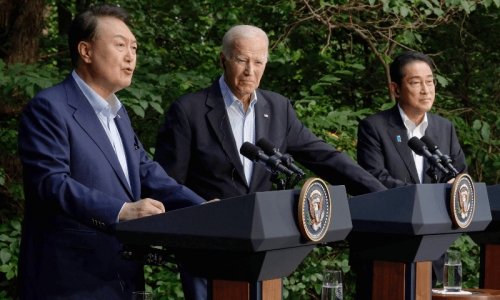
TOKYO: The United States on Sunday announced plans for a major revamp of its military command in Japan to deepen coordination with its ally’s forces, as the two countries labelled China the “greatest strategic challenge” facing the region.
The announcement followed security talks in Tokyo between US Secretary of State Antony Blinken and Secretary of Defence Lloyd Austin and their respective Japanese counterparts, Yoko Kamikawa and Minoru Kihara.
“The United States will upgrade the US Forces Japan to a joint force headquarters with expanded missions and operational responsibilities,” Austin told reporters after the so-called “2+2” talks.
“This will be the most significant change to US Forces Japan since its creation and one of the strongest improvements in our military ties with Japan in 70 years.” The ministers said in a joint statement that the new command structure would be implemented in parallel with Tokyo’s own plans to establish a joint command for its forces by March 2025.
The overhaul is among several measures taken to address what the countries said was an “evolving security environment”, noting various threats from superpower China.
Washington, Tokyo discuss ‘extended deterrence’, a term used to describe the US commitment to use its nuclear forces to deter attacks on allies
The statement criticised what it called Beijing’s “provocative” behaviour in the South and East China Seas, joint military exercises with Russia and the rapid expansion of its nuclear weapons arsenal. Beijing’s “foreign policy seeks to reshape the international order for its own benefit at the expense of others,” the ministers said in their statement.
“Such behaviour is a serious concern to the Alliance and the entire international community and represents the greatest strategic challenge in the Indo-Pacific region and beyond”.
Austin told reporters the command upgrade was “not based on any threat from China” but reflected the allies’ desire to work more closely and effectively. Japan provides a base for the US to project military power in Asia, hosting 54,000 American troops, hundreds of US aircraft and Washington’s only forward-deployed aircraft carrier strike group.
Prompted by China’s growing military might and regular missile tests by nuclear-armed North Korea, Japan has in recent years shifted dramatically from decades of postwar pacifism. In 2022 it unveiled a plan to double defence spending to two per cent of gross domestic product.
The new US command in Japan will be headed by a three-star general, a US official said, however, Austin said the US would not rule out appointing a four-star commander to Japan in the future as it has in neighbouring South Korea.
Nuclear umbrella
For the first time, the ministers also discussed “extended deterrence”, a term used to describe the US commitment to use its nuclear forces to deter attacks on allies. It is sensitive subject in Japan, which has pushed for non-proliferation of nuclear weapons and is the only country to have suffered atomic bomb attacks.
The countries discussed reinforcing extended deterrence to promote regional stability and deter the outbreak of conflict, according to an official readout that was scant on detail. “Amidst increasingly severe nuclear threats in the vicinity of Japan, it is important to further strengthen extended deterrence.
Published in Dawn, July 29th, 2024
















































Dear visitor, the comments section is undergoing an overhaul and will return soon.